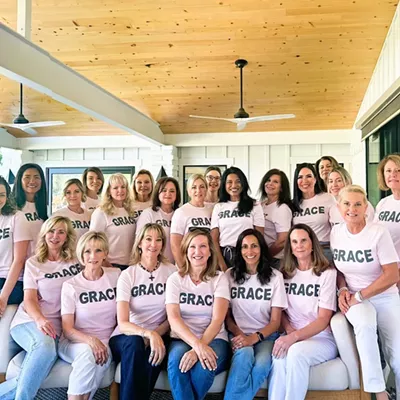Congresswoman Gabrielle Giffords was among the 229 Democrats and five Republicans who voted last month to repeal the "Don't Ask, Don't Tell" policy that prohibits openly gay men and women from serving in the military.
The "Don't Ask, Don't Tell" policy, established during the Clinton administration, kept a ban on gay soldiers in place, but allowed them to serve as long as they remained in the closet. Since it was put in place, more than 13,000 service members have been discharged for being gay, according to The Associated Press.
The new legislation, which still needs to be approved by the U.S. Senate, wouldn't immediately allow openly gay men and women to begin serving in the military. Instead, it removes a legal barrier to their service and allows the Defense Department and White House to begin establishing new guidelines under which gays could serve.
Under the bill, the "Don't Ask, Don't Tell" policy would be eliminated once a Department of Defense study is completed, and the military leaders and the president agree that it will not damage the military.
"Frankly, I think the ban hurts military readiness," Giffords says. "While fewer and fewer Americans are choosing to serve right now, the United States must recruit and retain the greatest number of the best and brightest Americans, especially during a time of war."
Giffords says that the military has discharged almost 800 mission-critical troops and at least 59 Arabic-speakers and 9 Farsi translators for being gay in the last five years.
"The reality is, times have changed," Giffords says. "You have even Dick Cheney saying that society has moved on, and we should reconsider the policy."
Public opinion appears to be moving toward accepting gays in the military. Two polls in February 2010—one by Quinnipiac University, and another by CBS News/The New York Times—showed that at least 57 percent of Americans favored allowing out gays to serve.
But Arizona Sen. John McCain has promised to fight the repeal of the ban when it comes time for a Senate vote.
In Arizona, reaction to the lifting of the ban has varied. Yuma Mayor Al Krieger, for instance, called gay soldiers a "bunch of lacy-drawered, limp-wristed people" who were unfit to serve.
Krieger initially stood by his comments, saying that George Washington and Abraham Lincoln would have said the same thing. But as outrage grew, he apologized.
Giffords' GOP opponents have been less blunt, but most of them oppose the repeal of "Don't Ask, Don't Tell."
Republican Brian Miller, who served as a pilot in the Air Force and still teaches pilots how to fly A-10s as a member of the Air Force Reserve, says he would not have voted to overturn the policy.
He says that "Don't Ask, Don't Tell" was "meant to minimize or eliminate the distraction of sexual orientation in the military, and to that end, I support it."
Miller says that he doesn't know whether allowing out gays and lesbians to serve would undermine the military.
"It would frankly depend on the reaction of the homosexual in the military," Miller says. "I have served with people who I suspect were homosexual, and it didn't affect anything. And that's because it wasn't talked about. ... It depends on how big a deal was made of it."
Jesse Kelly says the vote to overturn the ban "was a terrible move and completely unnecessary. Right now, it's a unit-cohesion issue; it's a recruitment and retention issue. We already have gays and lesbians serving in the military. Why would you make an issue of it right now?"
A former Marine who served in Iraq, Kelly says he doesn't believe open gays and lesbians would be able to serve without a negative impact on the troops.
"It's the nature of the beast in the military," Kelly says. "As someone who's been in a military platoon, that is how it is. Once someone was suspected of that, or thought of that way, there was nothing hateful coming out of it. It just affected the unit. It may be an uncomfortable fact, but it is a fact."
Kelly says he served with one Marine who turned out to be gay.
"I would never make the connection between his personal preferences and his performance on the job," Kelly says, "but I will tell you that this particular individual was the worst Marine I ever served with."
Former state lawmaker Jonathan Paton, a member of the Army Reserve, says the vote to overturn the "Don't Ask, Don't Tell" policy was premature.
"They should have waited until the military actually came out with their report," says Paton, who adds that he was unhappy that the legislation was attached to a defense-spending bill.
But if open gays are allowed to serve, Paton says that he believes soldiers would adjust to working alongside them.
"Any change that is made will cause a disruption, but you've got the best military in the world, and the military will do what they are ordered to do," Paton says. "But I think it's a mistake to make that decision based on politics and not on military readiness."
Andy Goss says he was "very, very disappointed" in the vote to repeal "Don't Ask, Don't Tell."
"The United States Armed Forces is not the place for social experiments," says Goss, a former Army sergeant who now works for a military contractor. "For those gays and lesbians who are in the United States military, they are already serving and already receiving their promotions. This is not an issue for them. Why make it one?"
Goss complains that sometimes, soldiers take advantage of training and then claim to be gay (sometimes falsely) so they can be discharged and go to work for military contractors who pay more money.
Despite that problem, he says overturning the policy "will create more problems than it will solve. There are going to be more claims of harassment."
Goss says allowing open gays and lesbians to serve would cause problems.
"I couldn't speculate on what the effect would be, but there are going to be some issues with it," he predicts.
Businessman Jay Quick is the only GOP candidate to say that the policy should be scrapped.
"I'd like to see it repealed," Quick says. "I was in the Marine Corps myself, and I served with gay Marines, and we never had a problem."








